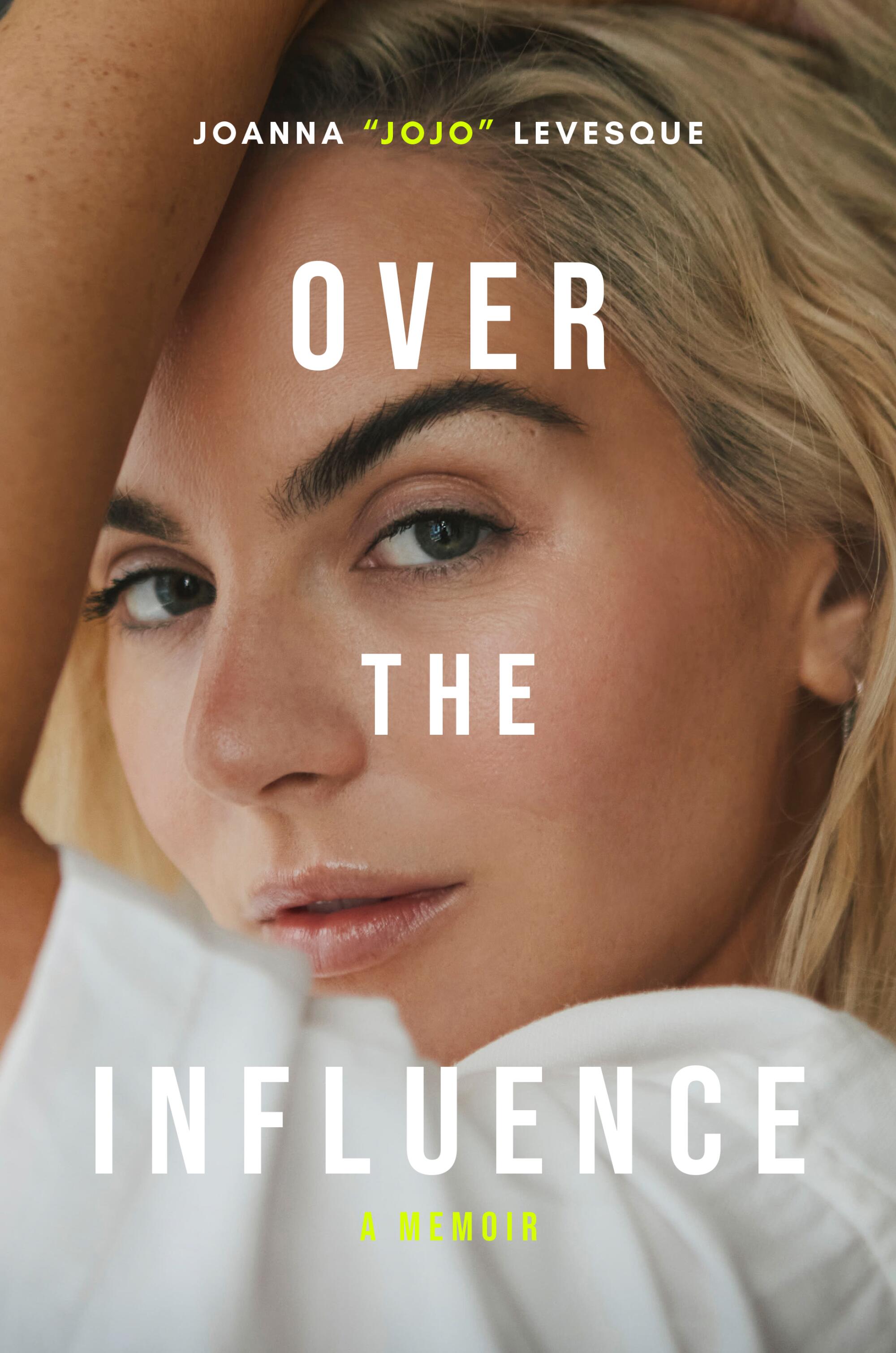As she writes in her new memoir, the battle for control is one that has followed Joanna “JoJo” Levesque throughout her personal life and career.
(David Urbanke/For The Times)
For a long time, Joanna “JoJo” Levesque resented “Leave (Get Out),” her best-known and most successful song, released in 2004 when she was just 13. “This song was on some sort of Disney channel,” she writes in her memoir, “Over the Influence.” Though she was the target demographic of the family programming she compared her song to, Levesque considered herself a wise-beyond-her-years R&B and soul singer, the genres she’d been steadily working in up until that point in her young life and which included the rest of her self-titled debut album.
“I like it now, but I didn’t understand it then,” says Levesque, 33, in a video call from his New York apartment.
“It’s a totally different experience singing ‘Leave (Get Out)’ or ‘Too Little Too Late’ or ‘Disaster’ or any of these songs that talk about breakups or relationships as an adult, compared to being 12, 15 or even 20 years old. You get more courage and texture and experience. It’s the difference between doing it over the phone and feeling it. I think about this person while I’m singing it and I can fall into that because I have the memory of telling someone to get out of my house, it’s done.”
Far from a one-hit wonder, Levesque has been working steadily since her first single, both as a singer and actress, including in the films “Aquamarine” and “GBF” and the show “All American.” Admittedly, her recording career never again reached the heights of “Leave (Get Out),” which made her the youngest female solo artist to reach number one on the Billboard Pop Songs chart, largely due to a protracted legal battle with her record label Blackground.
In 2013, Levesque filed a lawsuit against Blackground Records seeking to be released from her contract, which she signed as a minor and which, under New York state law, should have expired after seven years. Unable to release albums, she instead released mixtapes and “trios” (trio singles). The two sides settled out of court, but Levesque encountered similar creative differences at her next label, Atlantic Records.
“It was like everyone was encouraged to voice their opinions on what they thought I should do,” Levesque writes. “I came in with a vision, but I don’t even remember what it was anymore.”

“For much of my life, [I’ve felt] under the influence of other people's visions [as to] “What I should want and what my values should be,” says Joanna “JoJo” Levesque.
(David Urbanke/For The Times)
She finally found some independence by launching her own label, Clover Music, a joint venture with Warner Records, in 2017.
Long before Taylor Swift began re-recording her albums in 2021 after losing ownership when Scott Borchetta, the CEO of her former record label, Big Machine, sold her masters to music manager Scooter Braun, Levesque embarked on a re-recording journey of her own in 2018.
“That was between me and my fans so I could feel some sense of empowerment when my music wasn’t available on streaming services because my record label didn’t make a deal with the DSPs. [digital service providers]“I was sick of feeling like things were happening to me instead of me being in control,” she says.
Though Swift and Levesque had a “moment” during Swift’s “squad” era where they were friends, Levesque says Swift didn’t reach out to her for advice on re-recording her “Taylor’s Versions.” “I appreciate those who noticed that I did that a few years earlier,” Levesque says.

This battle for control is one that has followed Levesque throughout her career and, indeed, her life. The title of her memoir, “Over the Influence,” has a double meaning. First, it refers to intergenerational trauma: Her parents met at an Alcoholics Anonymous meeting, and her father, Joel, died from complications of drug addiction in 2015. Levesque says she is careful not to seem “judgmental” of her parents. But she doesn’t have to be: Levesque crafts a remarkably compassionate portrait not only of “my story” but also of her own. [but also] “Our story,” which is reinforced by the meticulous journal entries she has kept throughout her life, “was interesting to see the things I thought I had gotten over and hadn’t,” she says.
She also had many deep and meaningful conversations with her mother, Diana, who helped Levesque fill in the gaps in her own childhood memories as well as her parents' early relationship. “I'm grateful that she was willing to go there with me,” Levesque says.
Things certainly could have been much worse for Levesque as a child star. “Maybe I dodged a bullet,” he writes in “Over the Influence,” which opens Tuesday. “I’ve seen the doc and I listened to the podcasts and OH MY GOD.”
Levesque's mother was her reluctant manager, who shielded her from many things. Mothers often get a bad rap, but Levesque says she wasn't pressured to pursue fame at a young age. “I wanted a different life than the one my mother and I had, and I felt like I could be the one to take us there,” she says. Still, that's a lot for a preteen to handle.
“She did a great job of trying to keep me humble, but from a very young age, I wasn’t really told no, and I think that can create a monster. It gave me a false sense of the world. Yeah, [I’m] An only child. People are saying [me] that [I’m] So great and talented and [I] “Do I deserve certain things and then become famous?” she muses. “Only in retrospect can I see that I could have saved myself some headaches if I had had more parents, in a sense.”
The second allusion in the title of the book is to the freedom to determine one's own professional path.
“For much of my life, [I’ve felt] under the influence of other people's visions [as to] “What I should want and what my values should be: to rise to or surpass the success I had as a teenager,” he says.
“I am eternally grateful for [‘Leave (Get Out)’] “Because now I have a life that I really enjoy,” he adds later.
That includes her return as Satine in the Broadway production of “Moulin Rouge!” alongside Aaron Tveit.
“His voice moves me so much,” says Tviet. “He conveys so much emotion.” [it].”
Levesque made her Broadway debut as Satine in 2023, after a pandemic shutdown spent singing show tunes with her mother. She thrives on the repetition and stability that musical theater offers.
“I didn’t have much of that growing up. I was always doing different things – I was in a different city, with different people, moving around a lot,” she says. “As an adult who has an inner child, I’m giving her the structure she might have needed.”
Although Levesque performed in musical theater as a child, she now feels inspired by the combination of singing and acting that Broadway offers. “It’s a really exciting time for me, because a lot of my passions can blend seamlessly,” she says, adding that she’s been working on an original musical during the day, while performing as Satine at night.
“It's not for the faint of heart,” Tviet adds, but “I think it has a lot to offer musical theatre.”

Joanna “JoJo” Levesque’s memoir, “Over the Influence,” will be published on September 17.
(David Urbanke/For The Times)
After Tveit and Levesque say their final goodbyes on Oct. 13, Levesque has a tour and new music planned, under the tutelage of her co-manager Randy Jackson — yes, that Randy Jackson. Though the two connected in 2021 when Levesque was a contestant on “Name That Tune” (Jackson is the bandleader of the Fox game show), they had actually met years earlier when Levesque was just starting out. Jackson was interested in signing her to his record label at the time.
“I am interested in people who have had longevity. [I’ve been doing this for a long time]“But there are people who have been doing this for a long time and I want to know how you maintain good relationships, how you foster business relationships,” Levesque says of Jackson.
Jackson calls Levesque a “triple threat” of music, film and theater. “You have to be inspired by the person and their personality first, and then by the music.” [talent second]”, says.
The cool girl from the fairgrounds music video for “Leave (Get Out)” is certainly present in “Over the Influence” and is a character Levesque has adopted as a sort of “eccentric aunt” for her fans and others up and coming in the industry.
“I’m an only child, so I’m not anyone’s aunt, but I think I could help people,” she says. “I want to share what I have to give.”












